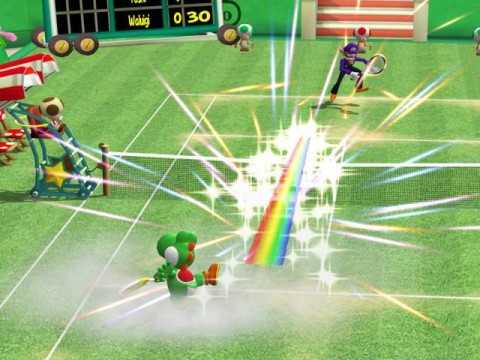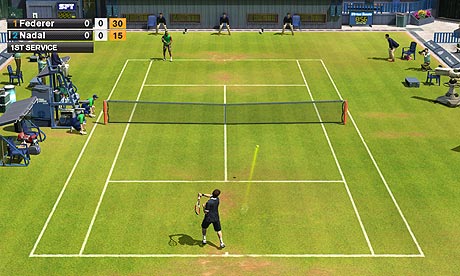Last updated on March 4, 2013
As I said a day ago, I’m not much interested in real life sports. Partly a result of upbringing, and partly as a perceived waste of time on my part, I don’t think they’re all that fascinating. However, the notable exception remains in the realm of digital sports – i.e., fake sports. Not, of course, Madden or its ilk – if I’m going to play a game created in real life, it had better do something different, insane, or not at all possible in real life. The point of most video games isn’t simulation – although that is a noble pursuit, as in Flight Simulator – but fantasy. Not empowerment fantasy, but entertaining fantasy, like a movie, television show, etc. It says something about me that I enjoy the light-hearted fantasy epics because they don’t force an investment of “meaning” into the story. It comes naturally, without fanfare and with a keen audience’s eye for detail.
Can you create sports narratives? Absolutely! How do you think ESPN stays in business? World Wrestling Entertainment takes these same tropes and exaggerates them – making it much more fun in the process. I play professional wrestling video games, but not sports games! For one, a Madden game’s never going to introduce you to the players at hand – I don’t know a Peyton Manning from a Derek Jeter or a LeBron James, although I can tell they all play different sports (do they?). The real sports news world revolves around such personalities – if not for said personality, than certainly for their skill. Furthermore, most sports games assume you know the rules. Me? How do you play American football? Honestly, I could tell a touchdown from a goal kick, but why so many pauses? What’s a down? I don’t know off the top of my head. I could totally look it up on Wikipedia, but I have no interest in the subject matter.

Am I ignorant? I suppose. But understanding the rules requires watching the game a LOT. Professional sports have lots of rules surrounding a central concept, and these little rules make the game. Most times, I find myself completely confused as to what happened. Mostly it’s a lack of interest. Professional sports watching rewards a subscription mentality – you must watch to understand what happened, and other passionate people (usually parents or the like) can tell you why sport X rocks the house. I was given the decision to like what I like, and not be forced into the mold of my parents – hence, when it came time to grasp onto hobbies, sports wasn’t on the list. Nor was my father or mother interested all that much in sports. Video games were a constant presence, however, which may explain much about my tastes.
Consider the obvious: if you spent hundreds of hours saving the world from all manner of evil creatures and madmen in intricate fantasy worlds depicting the power of comraderie and friendship in the face of overwhelming odds, you’d find sports a bit boring. As I said earlier, ” Video games, by contrast, force interactivity on the player and force you to play. They force you to invest meaning into somewhat arbitrary proceedings, and that’s why they’re fun.” Scratch that; that’s why they’re engaging. Sports aren’t usually that active because the act of watching it becomes a kind of ritual.
Heck, everybody I know (almost) watches the Super Bowl in some capacity, whether for the game itself, the concert at half-time, or to watch funny commercials (I question the logic behind watching the excruciatingly slow game for a bunch of thirty second snippets of fun). I watched exactly one – 1996’s Patriots versus Packers, but I found next to no enjoyment in it. I wasn’t a participant. The modern incarnation of sports remains a passive activity. You watch, you get the rules, you see the players, and I guess you can have conversations with other people about sports. If I was playing it, it’d be a different story, but many of us stay content with watching other people do amazing things, rather than doing those same things ourselves. What a weird culture, huh?
Video games, on the other hand, force interactivity in some respect. Whether you’re trying to avoid death of your in-game avatar, or you’re simply paying attention to a story, there’s always a level of engagement when you’re in a video game world. Same goes for digital sports. Whether it’s Mario Kart, Golf, Tennis, or Basketball, they take these games and make them interesting for me. Power shots make Mario Tennis a little more complicate than the base game; power shots and weather in Mario Golf make accuracy a difficult objective. Mario Kart’s weapon systems and elaborate (yet easily digestible) course designs make each race a thrilling and tense affair. However, each one has a simple control scheme that makes them easy to learn, yet difficult to master. You don’t need to know the intricacies of each sport to enjoy, and eventually master, their fake virtual counterparts.

Even Virtua Tennis (Power Smash in Japan) remains much more accessible than normal tennis. Although it comes from arcade roots, its two button control scheme provide a complex array of options for hitting that tennis ball! Hitting the ball in one direction or another is a simple matter of pressing one or both buttons, then holding the stick in the direction you want the ball to go. The longer you hold the shot, the more powerful it will be. Come to think of it: the game was designed for an arcade joystick, rather than the traditional controller – this allows for completely tight controls with few errors. Having just found that I have been playing the game wrong, I suppose I’ll have to revisit it.

Plus, we can ALL play these games. It’s accessible to just about anyone who expresses interest. Anyone can get into the competitive spirit here, while still playing a recognizable game to the majority. All of this is a roundabout way to express the notion that, yes, fake sports inspire much more dedication, craft, and understanding of the average consumer than modern sports. If we didn’t have a culture of sports as a national pasttime, an establishment, who would even know the rules of said games? Yet video games can get a anti-sports curmudgeon like me to play these games and enjoy them without having to worry about batting percentages and team trading. Neither must I suffer any of those extraneous elements that make the sports culture a bizarre and impenetrable conversation piece to people like me. In fact, it’s the accesibility of said fake sports that make them fun without making them time-wasting diversions.
Jesus had a knack for simplifying the entirety of the Pentateuch into such a simple format. Take Matthew 22 for example:
34 Hearing that Jesus had silenced the Sadducees, the Pharisees got together. 35 One of them, an expert in the law,tested him with this question: 36 “Teacher, which is the greatest commandment in the Law?”
37 Jesus replied: “‘Love the Lord your God with all your heart and with all your soul and with all your mind.’ 38 This is the first and greatest commandment. 39 And the second is like it: ‘Love your neighbor as yourself.’ 40 All the Law and the Prophets hang on these two commandments.
Nearly every Christian on earth says this (except for some cult-types, I imagine). Now, you might imagine this comes from how essential it is to the Christian faith. On the other side of the coin, Jesus just condensed 613 very specific rules and regulations on the Jewish people into two simple, yet difficult to master, commandments that represent obedience to God. The Pharisees, in this case, show us very devout religious leaders who attempt to memorize and implement these commands, yet fall to hypocrisy instead. Jesus, on the other hand, loves God and loves people – this is sufficient.
And when it comes to sports, simple yet complex rings a better tone than “horribly complex structure and rules on top of very simple game”.
